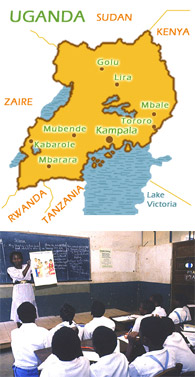US-funded "abstinence-only" programs are jeopardising Uganda's successful fight against HIV/AIDS, Human Rights Watch said in a new report on March 30. Abstinence-only programs deny young people information about any method of HIV prevention other than sexual abstinence until marriage.

Draft secondary-school materials state falsely that latex condoms have microscopic pores that can be permeated by HIV, and that pre-marital sex is a form of "deviance." HIV/AIDS rallies sponsored by the US government spread similar falsehoods.
"These abstinence-only programs leave Uganda's children at risk of HIV," said Jonathan Cohen, a researcher with Human Rights Watch's HIV/AIDS Program and one of the report's authors. "Abstinence messages should complement other HIV-prevention strategies, not undermine them."
US officials describe their strategy in Uganda as "ABC"�a popular acronym standing for "Abstinence, Be Faithful, use Condoms." Some experts credit the "ABC" strategy with helping to reduce HIV prevalence in Uganda from about 15% in the early 1990s, to less than 10% today. However, Human Rights Watch's new report documents how condoms are left out of the equation, especially for young people.
A draft "Abstinence and Being Faithful (AB)" policy released in November 2004 by the Uganda AIDS Commission cautions that providing information about condoms alongside abstinence can be "confusing" to youth.
Teachers told Human Rights Watch that they have been instructed by US contractors not to discuss condoms in schools because the new policy is "abstinence only."
President Museveni has publicly condemned condoms as inappropriate for Ugandans, leading some AIDS educators to stop talking about them.
Uganda faces a nationwide condom shortage due to new government restrictions on condom imports. In late 2004, the Health Ministry recalled batches of imported condoms, allegedly due to failed quality control tests. Instead of addressing the shortage, some ministers suggested that Ugandans adopt abstinence as a preferable HIV-prevention strategy.
"Uganda is gradually removing condoms from its HIV/AIDS strategy, and the consequences could be fatal," said Tony Tate, a researcher with Human Rights Watch's Children's Rights Division and the report's co-author. "Delaying sex is surely a healthy choice for young Ugandans, but youth have a right to know that there are other effective means of HIV prevention."
The US government has already budgeted approximately US $8 million this year on abstinence-only programs in Uganda as part of President George W. Bush's global AIDS plan. The National Youth Forum, headed by Ugandan First Lady Janet Museveni, a vocal proponent of abstinence-only, has received US funding under the plan. The First Lady has lashed out against groups that teach young people about condoms and called for a national "virgin census" to support her abstinence agenda. The Virginia-based Children's AIDS Fund, an organisation with close ties to Janet Museveni, was recently approved for a major abstinence-only grant, despite having been deemed "not suitable for funding" by a technical panel of the US Agency for International Development (USAID).
"Abstinence-only programs are a triumph of ideology over public health," said Cohen. "Americans should demand that HIV-prevention programs worldwide stick to science."
Uganda gained a reputation in the 1990s for its high-level leadership against HIV/AIDS and acceptance of sexually candid HIV-prevention messages. But public health experts and Ugandan AIDS organizations fear that the shift toward abstinence-only programs will reverse this success. Abstinence programs have been used since 1981 in the United States, where they have proven in numerous independent studies to be ineffective and potentially harmful.
Ugandan, US Reaction
Meanwhile, officials and church leaders in Uganda called the HRW report "seriously flawed." Uganda has strongly denied charges that it no longer promotes condoms as part of its fight against AIDS - seen as one of the most successful in the world.
The American embassy has also denied claims that that it is pushing Uganda to promote abstinence instead of condom use in the fight against HIV/AIDS, according to news web site, allafrica.com. In an interview with the Voice of America on March 30, the Public Affairs Officer at the Kampala embassy, Mr Mark Schlachter, said the Ugandan and American governments have always maintained the ABC approach to prevention and denied that all programmes funded by the President George Bush Emergency Plan for Aids Relief focus on abstinence alone.











 Printable Version
Printable Version










Reader's Comments
Be the first to leave a comment on this page!
Please log in to use this feature.